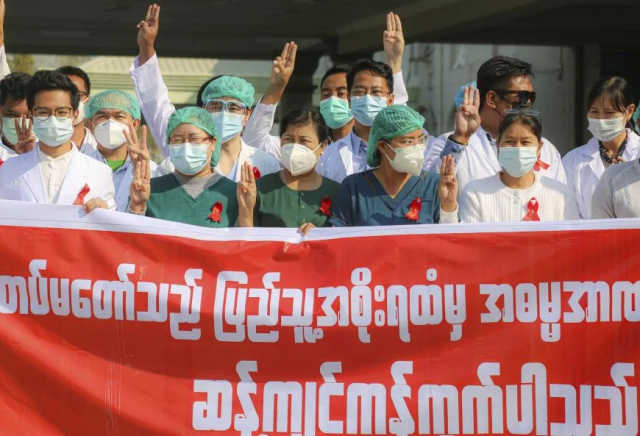Myanmar: Coup Crushes Democratic Rule


Medical workers stand in a “Red Ribbon Campaign” demonstration at a hospital in Mandalay, Myanmar, protesting against the military coup, February 3, 2021. © 2021 Kaung Zaw Hein / SOPA Images/Sipa USA via AP Images
Military Junta’s Abuses Amount to Crimes Against Humanity
(New York) – The February 1, 2021 military coup in Myanmar overthrew democratic rule and plunged the country into steadily worsening rights abuses, Human Rights Watch said today in its World Report 2022. Security forces under the junta led by Sr. Gen. Min Aung Hlaing committed widespread and serious abuses that amount to crimes against humanity.
“Myanmar’s long abusive military dismantled the democratically elected government, committed crimes against humanity against anti-coup protesters, and renewed atrocities in ethnic minority areas,” said Brad Adams, Asia director at Human Rights Watch. “Concerned governments should respond to this human rights crisis with targeted sanctions and an international armed embargo, and by cutting off revenue streams to the junta.”
In the 752-page World Report 2022, its 32nd edition, Human Rights Watch reviews human rights practices in nearly 100 countries. Executive Director Kenneth Roth challenges the conventional wisdom that autocracy is ascendent. In country after country, large numbers of people have recently taken to the streets, even at the risk of being arrested or shot, showing that the appeal of democracy remains strong. Meanwhile, autocrats are finding it more difficult to manipulate elections in their favor. Still, he says, democratic leaders must do a better job of meeting national and global challenges and of making sure that democracy delivers on its promised dividends.
Millions took to the streets across the country in largely peaceful protests to call for the military to relinquish power, while members of parliament, ethnic minority representatives, and civil society activists formed a National Unity Government to contest the junta. Myanmar security forces responded by committing offenses amounting to crimes against humanity, including murder, torture, deprivation of liberty, enforced disappearances, and rape and other sexual abuse.
Between February 1 and December 1 the police and military killed at least 1,300 protesters and bystanders, including approximately 75 children, and detained over 10,596 protesters, government officials, activists, journalists, and civil servants. The National League for Democracy (NLD) leader, Aung San Suu Kyi, was among the first arrested on February 1, and she remains in custody on fabricated criminal charges.
Anti-junta People’s Defense Forces (PDF) militias formed throughout the country, targeting security force personnel and perceived civilian supporters of the junta. Some have carried out unlawful bombings of public areas and buildings. The military responded with attacks on civilians and the destruction of urban neighborhoods and rural villages. Intense fighting in ethnic minority areas, notably in the northwest Chin State and Sagaing Region, has displaced 30,000 people.
The 600,000 Rohingya remaining in Myanmar since the military’s 2017 campaign of ethnic cleansing and acts of genocide in Rakhine State remain confined to camps and villages where they are subjected to the crimes against humanity of persecution and apartheid. They are denied access to adequate food, health care, education, and livelihoods. Following the coup, restrictions on humanitarian access increased, leading to preventable deaths and illnesses in Rohingya camps and villages.
Increased fighting between the Myanmar military and ethnic armed groups in Chin, Kachin, Karen, Karenni, and Shan States has hindered access to humanitarian aid. Food shortages have been reported throughout the country, and the United Nations estimated the number of people facing hunger could be as high as 6.2 million.
Canada, the European Union, the United Kingdom, and the United States have imposed various targeted sanctions against Myanmar’s top military officials and military-controlled companies. However, no governments have imposed sanctions or other economic blocks on the junta’s oil and natural gas revenues, its single largest source of foreign currency.
In June, the UN General Assembly passed a resolution strongly condemning the coup. The General Assembly also made several important recommendations, including calling for all member states to halt the flow of arms into Myanmar. However, the UN Security Council did not follow up to pass a binding resolution imposing a global ban on weapons transfers to Myanmar.

